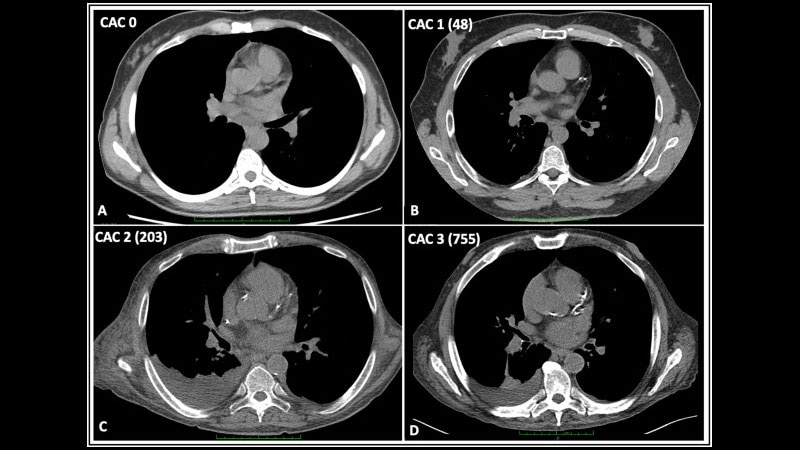Coronary Calcium vs. Polygenic Risk Score for CHD Prediction
Core Concepts
Coronary artery calcium score is a superior predictor of coronary heart disease events compared to the polygenic risk score.
Abstract
The study compared the predictive utility of coronary artery calcium (CAC) score and polygenic risk score in identifying individuals at risk for coronary heart disease (CHD). Here are the key highlights and insights from the content:
CAC score on computed tomography showed better risk discrimination for CHD events than the polygenic risk score.
The study involved middle-aged and older White adults from the U.S. and the Netherlands.
Direct visualization of calcification in arteries by CAC score may explain its superiority over genetic variants.
Traditional risk factors, CAC score, and polygenic risk score were used to calculate CHD risk.
Both scores were significantly associated with the 10-year risk of incident CHD.
The CAC score had a higher C statistic compared to the polygenic risk score, indicating better risk discrimination.
Net reclassification significantly improved with CAC plus pooled cohort equations, while the polygenic risk score did not show significant improvement.
The use of CT imaging in patients at intermediate risk for heart disease can refine risk estimation and guide therapy recommendations.
Coronary Calcium Bests Polygenic Risk Score to Predict CHD
Stats
The CAC score had a C statistic of 0.76 (95% CI, 0.71-0.79) vs. 0.69 for the polygenic risk score (95% CI, 0.63-0.71).
Net reclassification significantly improved with the CAC plus PCEs by the following values: 0.19 (95% CI, 0.06-0.28).
Quotes
"The use of CT in patients who are at intermediate risk for heart disease can be helpful in refining risk estimation and guiding recommendations for lipid-lowering therapy." - Dr. Kahn
Key Insights Distilled From
by Diana Swift at www.medscape.com 05-25-2023
http://www.medscape.com/viewarticle/992455
Deeper Inquiries
How can the findings of this study impact current cardiovascular risk assessment practices
The findings of this study can significantly impact current cardiovascular risk assessment practices by highlighting the superiority of the coronary artery calcium (CAC) score over the polygenic risk score in predicting coronary heart disease (CHD) events. Incorporating the CAC score into risk assessment can provide better risk discrimination and significantly improve risk classification when added to traditional cardiovascular risk factors. This suggests that utilizing CT imaging to visualize calcification in the arteries and assess subclinical disease burden may offer more accurate risk prediction compared to focusing solely on common genetic variants. Therefore, the study's results advocate for the inclusion of CAC scoring in current risk assessment protocols to enhance the identification of individuals at risk for heart disease.
What are the implications of favoring the CAC score over the polygenic risk score in clinical decision-making
Favoring the CAC score over the polygenic risk score in clinical decision-making has several implications for patient care and treatment strategies. By prioritizing the CAC score, healthcare providers can obtain a more precise assessment of an individual's risk for CHD events, allowing for targeted interventions and personalized treatment plans. The CAC score's ability to improve risk classification when combined with traditional risk factors can guide recommendations for lipid-lowering therapy in patients at intermediate risk for heart disease. In contrast, the study suggests that polygenic risk scores may not offer significant additional value in predicting heart disease risk in middle-aged to older adults beyond what traditional risk factors already provide. Therefore, emphasizing the CAC score in clinical practice can lead to more effective risk management and better outcomes for patients at risk of CHD.
How might advancements in genetic research influence future approaches to predicting heart disease risk
Advancements in genetic research are likely to play a crucial role in shaping future approaches to predicting heart disease risk. As genetic technologies and understanding of genetic factors continue to evolve, there is a growing interest in incorporating genetic information into risk assessment models. While this study found that the polygenic risk score did not outperform traditional risk factors and the CAC score in predicting CHD events, ongoing research in genetics may uncover new genetic markers or pathways that could enhance risk prediction accuracy. Future approaches may involve integrating a more comprehensive set of genetic variants, gene-environment interactions, and epigenetic factors into risk assessment models to improve the identification of individuals at risk for heart disease. As genetic research progresses, it is essential to evaluate and validate the clinical utility of genetic information in predicting heart disease risk to ensure its effective integration into cardiovascular risk assessment practices.
0
More on Healthcare
